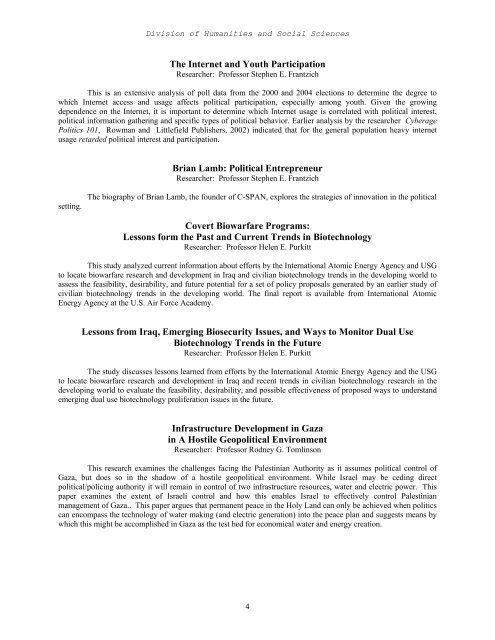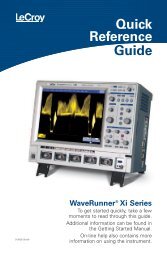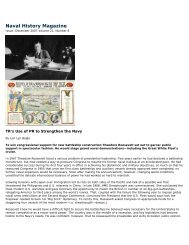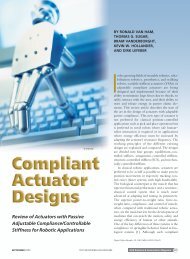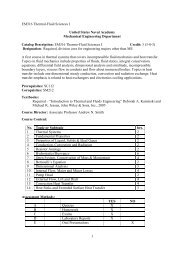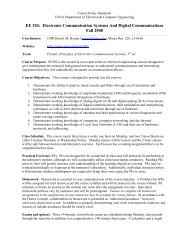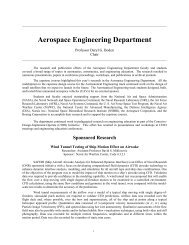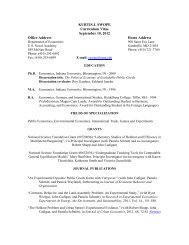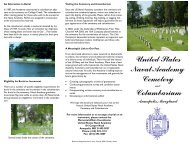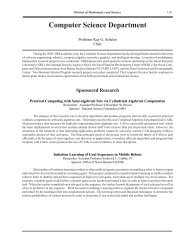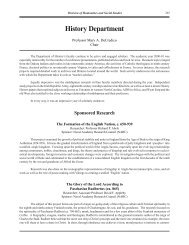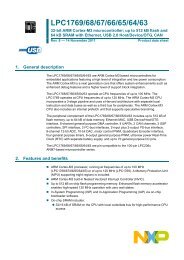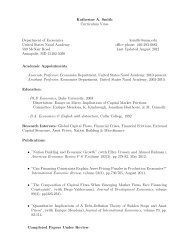Political Science Department - United States Naval Academy
Political Science Department - United States Naval Academy
Political Science Department - United States Naval Academy
- No tags were found...
Create successful ePaper yourself
Turn your PDF publications into a flip-book with our unique Google optimized e-Paper software.
Division of Humanities and Social <strong>Science</strong>sThe Internet and Youth ParticipationResearcher: Professor Stephen E. FrantzichThis is an extensive analysis of poll data from the 2000 and 2004 elections to determine the degree towhich Internet access and usage affects political participation, especially among youth. Given the growingdependence on the Internet, it is important to determine which Internet usage is correlated with political interest,political information gathering and specific types of political behavior. Earlier analysis by the researcher CyberagePolitics 101, Rowman and Littlefield Publishers, 2002) indicated that for the general population heavy internetusage retarded political interest and participation.Brian Lamb: <strong>Political</strong> EntrepreneurResearcher: Professor Stephen E. Frantzichsetting.The biography of Brian Lamb, the founder of C-SPAN, explores the strategies of innovation in the politicalCovert Biowarfare Programs:Lessons form the Past and Current Trends in BiotechnologyResearcher: Professor Helen E. PurkittThis study analyzed current information about efforts by the International Atomic Energy Agency and USGto locate biowarfare research and development in Iraq and civilian biotechnology trends in the developing world toassess the feasibility, desirability, and future potential for a set of policy proposals generated by an earlier study ofcivilian biotechnology trends in the developing world. The final report is available from International AtomicEnergy Agency at the U.S. Air Force <strong>Academy</strong>.Lessons from Iraq, Emerging Biosecurity Issues, and Ways to Monitor Dual UseBiotechnology Trends in the FutureResearcher: Professor Helen E. PurkittThe study discusses lessons learned from efforts by the International Atomic Energy Agency and the USGto locate biowarfare research and development in Iraq and recent trends in civilian biotechnology research in thedeveloping world to evaluate the feasibility, desirability, and possible effectiveness of proposed ways to understandemerging dual use biotechnology proliferation issues in the future.Infrastructure Development in Gazain A Hostile Geopolitical EnvironmentResearcher: Professor Rodney G. TomlinsonThis research examines the challenges facing the Palestinian Authority as it assumes political control ofGaza, but does so in the shadow of a hostile geopolitical environment. While Israel may be ceding directpolitical/policing authority it will remain in control of two infrastructure resources, water and electric power. Thispaper examines the extent of Israeli control and how this enables Israel to effectively control Palestinianmanagement of Gaza.. This paper argues that permanent peace in the Holy Land can only be achieved when politicscan encompass the technology of water making (and electric generation) into the peace plan and suggests means bywhich this might be accomplished in Gaza as the test bed for economical water and energy creation.4


